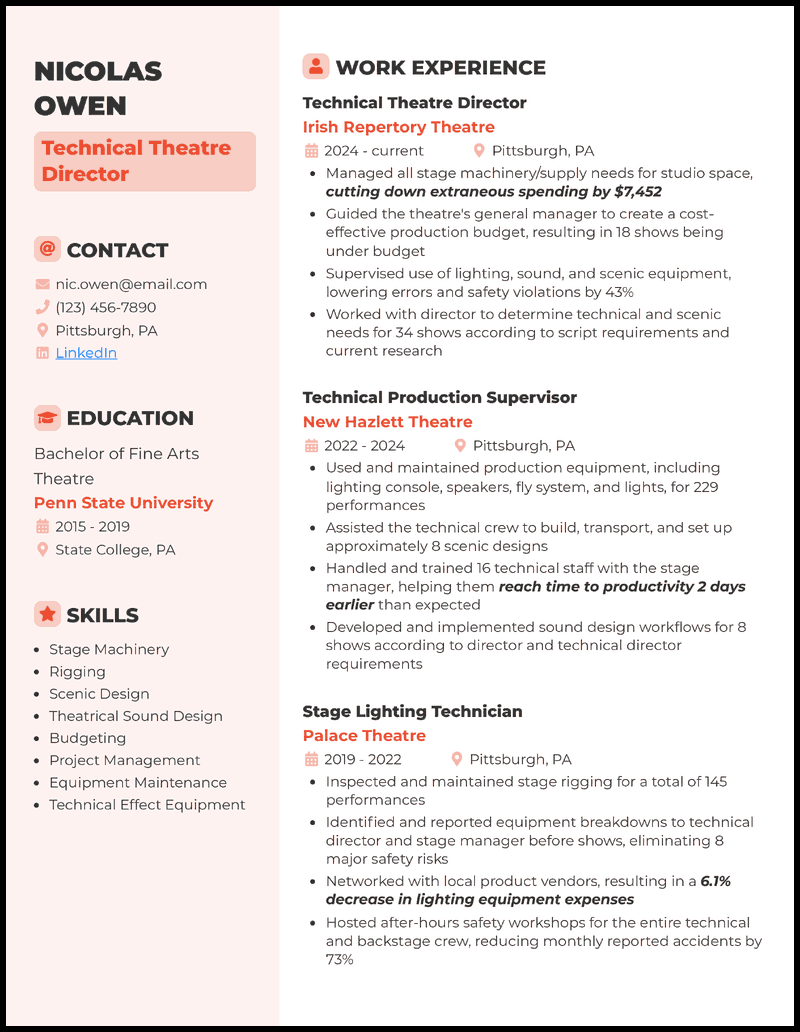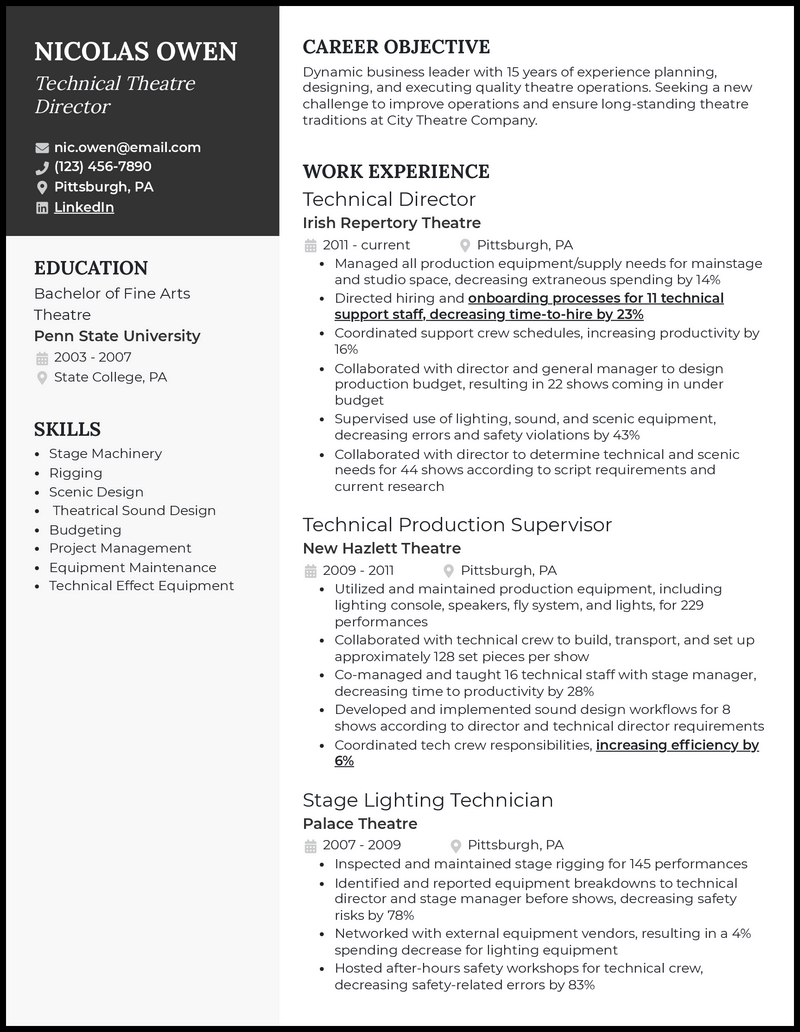Lighting! Sound! Cameras! You handle all the technical stuff that goes into an excellent theatre production and an enchanting experience for the audience. You also often oversee props and costumes alongside the other stage assets.
But how do you write a resume that will dazzle recruiters, just as your perfect video clips of an amazing performance dazzle?
Don’t worry about it! We’ve spent years guiding people in theatre with their resumes, and we’ve assembled three technical theatre resume examples to help you get things moving, too.
Why this resume works
- So, you’ve got some serious chops and you know it. But honestly, recruiters won’t just take your word for it—they need a track record that shows you’re as good as you say. It’s time to spruce up your technical theatre resume with numbers-backed outcomes.
- Perhaps, you maintained production equipment for over 200 performances. Or recount when you slashed extraneous spending, by let’s say around 14%, all by overseeing production supplies. The hiring manager is all fired up to hear about such feats and everything else that makes you the crème de la crème.
Related resume examples
What Matters Most: Your Skills & Background Experience

Oh, those skills are important! Many theatre professionals wear many hats, so you can’t generalize. Show recruiters that you’re ready for each performance with skills that are relevant to your niche, like stage machinery and rigging.
A few skills are bound to overlap between careers (like project management or most design-related things), but you can mention these briefly alongside your super technical skills and then elaborate on their relevance later in the experience section.
We just can’t stress it enough: Be specific. Of course, you’re awesome with machinery—you work in technical theatre! Hone your skills to demonstrate how sharp and well-practiced you are: Don’t say “setup” if you mean “rigging.”
9 most popular technical theatre skills
- Stage Machinery
- Scenic Design
- Rigging
- Stage Lighting
- Theatrical Sound Design
- Performance Budgeting
- Machine Maintenance
- Project Management
- Stage Crew Support
Sample technical theatre work experience bullet points
Now that you’ve shared the amazing tools you have at your disposal, recruiters want to see how they work on stage! Share qualifying experiences you’ve had driving successful performances through your technical prowess and teamwork.
Just make sure each example ties in with technical theatre, even if the job itself didn’t. After all, project management is crucial in each production! And if you have a hefty past in theatre, focus on technical aspects that will bolster your new role.
Set off any experience point with a good metric that shows your impact, like attendance rates, profit percentages, or star ratings.
Here are some examples of good experience bullet points:
- Hosted after-hours safety workshops for technical crew, decreasing safety-related errors by 83%
- Collaborated with director and general manager to create production budget, resulting in 22 shows coming in under budget
- Directed hiring and onboarding processes for 11 technical support staff members, decreasing time-to-hire by 23%
- Supervised use of lighting, sound, and scenic equipment, decreasing errors and safety violations by 43%
- Utilized and maintained production equipment, including lighting console, speakers, fly system, and lights, for 229 performances that elevated overall venue ratings to 4.8/5 stars
Top 5 Tips for Your Technical Theatre Resume
- Layout is big!
- The layout of your resume is as important as the stage layout that can make or break a good performance. Check out our three technical theatre resume templates and see which one gives your personal attributes the best visual flow while delivering your best qualifications center stage.
- Demonstrate advancement
- Your role is pretty specialized! Show recruiters that you’ve been through the school of hard knocks that it takes to reach your level of technical expertise. Feature experience points that get increasingly complex as you work up through your resume’s reverse chronological order.
- Try to find a theme
- To set yourself apart from other applicants, try to find your “niche within a niche” and center your prime experience points around it. Are you extra good at sound or lighting design? Or maybe budgeting and project management?
- About those soft skills:
- When we talk about working interpersonal skills into your experience points, we’re talking about context. By mentioning that you collaborated with crew members and the general manager to get things done, you’re subtly highlighting your ability to work with people in a variety of context. This makes you a great asset!
- Consider a cover letter
- If your awesome professional experiences are just too vast to contain within one page (and your resume really does need to be one page or less!), try moving some of your favorites to an AI cover letter. There, you can give more backstory on how those accomplishments qualify you for the job.
The job description can give you some great insight here. Re-read it and look for the “mood lighting” that indicates what the work culture there is like. Does the job ad sound more formal and upscale, or more related to an artsy/indie venue?
Here’s where some people trip up. Less is more in terms of color usage, no matter how laid-back the backstage culture is where you’re applying. Recruiters need to read fast, so keep colors to a classy minimum and stick with clean, modern fonts.
It might help! If you’re just starting out in technical theatre, a career objective that quickly lays out why you’re qualified for the role can help. If you’ve already racked up more qualifications than you know what to do with, you may not need a summary—but if you’d rather give your greatest points room to breathe, you might want one.








